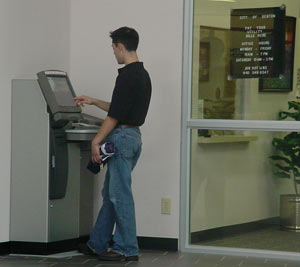Article
Self-service city hall: the benefits of e-gov kiosks
Many interactions between citizens and their local government are routine and repetitive - in other words, ripe for a self-service solution. A well-designed e-government kiosk can save time, resources, and taxpayer frustration.
August 28, 2005 by James Bickers — Editor, Networld Alliance
As was the case in most towns in America, officials in the city of Denton, Texas spent the late 1980s watching sprawl push both businesses and residents from downtown to the newly formed suburbs. The notion of what City Hall should look like, and where it should be located, was changing.
Denton took a "if you can't beat 'em, join 'em" approach: In 1998, it teamed with Blacksburg, Va.-based Tele-Works to create the "City Hall in the Mall" program, which put a satellite government office in the area's major shopping mall.
"We wanted to have a City Hall in the Mall presence, but when you lease space you also have to be open during mall hours," said Denton director of technology services Alex Pettit. "Big pain to us, particularly Saturday nights and Sunday afternoons, and extended hours between Thanksgiving and Christmas. So we reached an agreement with them that if we had a kiosk and it could accept payments, we could reduce our hours of operations."
 This story and all the great free content on KioskMarketplace is supported by: Your reliable one-stop shop for standard or custom touch-input components and turn-key information kiosk systems.  |
Government kiosks can do more than just accept payments - a large number of municipal services, from library book renewal to fishing license sales, make sense as kiosk applications.
A (qualified) success story
The Denton program involved two kiosks, the first of which was placed in the police department and collects payments via credit card only. The second, placed in the mall, accepts cash and checks in addition to credit cards, and has generated much more activity. "We will be replacing the police department device with one that accepts cash and check, and we expect our collections from that device to increase correspondingly," Pettit said.
Flexibility of payment method is particularly important in a town like Denton, which is home to two universities, Texas Woman's University and the University of North Texas. "It is not uncommon for two (roommates) to go to the kiosk, one pay half of their (utility) bill with cash and the other write a check for the other half," he said.
Enabling utility customers to pay their bill is a high priority: according to Pettit, a disconnect and re-connect costs the city about $40 to perform. Denton only charges a $30 re-connect fee, though, motivating the town to keep disconnects from happening.
"We have worked very hard to reduce these disconnects, and the kiosk has been one of our tools to do this," he said, adding that disconnects are down 25 percent in the past year, thanks in part to the convenience the kiosks offer and the ability of customers to pay their bills after hours.
 "I think that all towns and municipalities are candidates for self-service technology, as long as there is a compelling need for it in the first place," said Tim Kearns, director of marketing for Portsmouth, R.I.-based MontegoNet. "If a small-town city hall processes 50 fishing permits per year, they probably won't find much benefit in a self-service fishing permit kiosk. I think it's more useful to think of the ideal application - rather than the ideal municipality - for self-service."
"I think that all towns and municipalities are candidates for self-service technology, as long as there is a compelling need for it in the first place," said Tim Kearns, director of marketing for Portsmouth, R.I.-based MontegoNet. "If a small-town city hall processes 50 fishing permits per year, they probably won't find much benefit in a self-service fishing permit kiosk. I think it's more useful to think of the ideal application - rather than the ideal municipality - for self-service."
Keeping it simple
In order for an e-gov kiosk to succeed, the service it provides needs to be a fairly simple one. Alan Webber, senior government analyst for Forrester Research, points to "lower-level transactions" as prime candidates for self-service.
"It should be something that citizens need to do but takes very little time and a low level of transaction," he said. Examples he cites include parking ticket payments, license and library book renewal, automated parking meters, purchasing mass-transit tickets and paying municipal utility bills.
More complex transactions don't make as much sense, he said, even though the technology exists to make them possible. In the case of a driver's license, for instance, some relatively complex biometric information might be collected along with a photo, which would make the experience more involved than many individuals would feel comfortable with.
Webber also emphasized the need for a method of escalation if a problem arises that cannot be handled by kiosk alone.
"If the parking ticket is too old to be paid via the kiosk, then it should inform the citizen that they will be receiving a letter in the mail or an e-mail explaining what the problem is and what they need to accomplish this," he said.
Beyond bill payment
|
While transactional e-gov kiosks are the most obvious application, both Kearns and Webber see value in using the machines for informational purposes, community outreach, tourism and job training.
"I think that city governments in particular can enhance the visitor experience by deploying tourism kiosks in hotels, transportation hubs and tourist attractions," Kearns said.
Webber agreed, and added that governments should partner with non-government entities to deliver information and services through the kiosks.
"If a citizen can pay their municipal water bill or parking ticket through a kiosk, why not be able to pay your local cable bill?" he asked. "If a tourist is able to receive information on local public parks, why not also give them information on the chamber of commerce-sponsored musical or concert taking place Saturday night at the park?"












